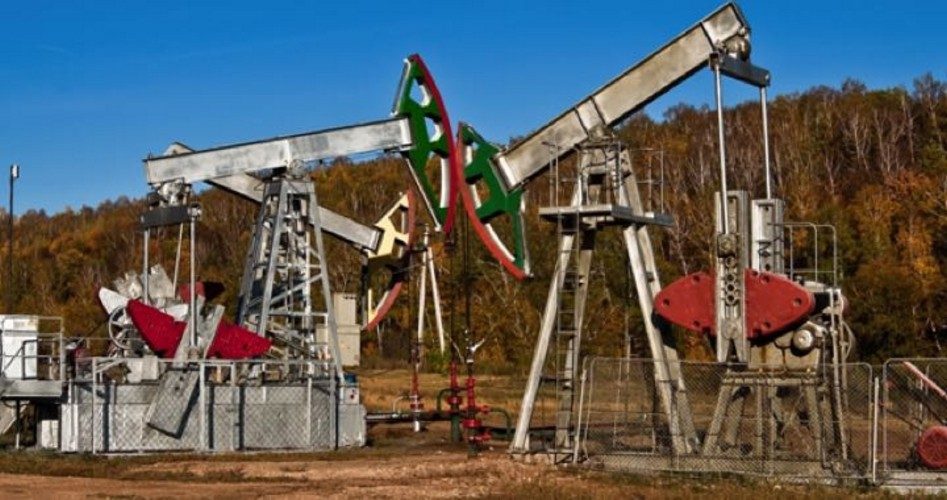
In an interview with CNNMoney in June, Pioneer Natural Resources Chairman Scott Sheffield said he expected U.S. crude oil production to surpass 11 million barrels a day by this fall, making the United States the world’s top oil producer. Right on schedule the Energy Information Administration announced on Thursday that the U.S. oil industry produced 11.3 million barrels of crude oil a day during August, an increase of 416,000 barrels from the previous month and topping production from Saudi Arabia and Russia. That level of crude oil production is more than 2 million barrels a day ahead of August 2017, the largest increase over any 12-month period in U.S. history.
Sheffield told CNNMoney that “we’ll be at 13 [million] very quickly” and predicted that that number could jump to 15 million in a very few years.
On Wednesday U.S. Interior Secretary Ryan Zinke told Fox News that officially “today we are the largest oil and gas producer on the face of the planet, rolling through 11 million … on our way to 14.”
In less than 10 years, thanks largely to the development of, and continued improvement to, fracking technology, U.S. crude oil production has more than doubled, from 5 million bpd (barrels per day) in 2008 to more than 11 million today.
This has immediate as well as long-term ramifications that extend far beyond gas prices at the pump. On October 3, the price of crude for November delivery was over $76 a barrel. At Friday’s close the price for December delivery was below $63. Gas prices, which had hit more than $3 a gallon in many places in the country, now average $2.77 a gallon at the pump with further declines expected.
The record puts the United States in the position where it will no longer be bullied by OPEC. As Patrick Buchanan pointed out on Tuesday, OPEC still thinks it can push the United States around:
Over the Weekend Donald Trump warned of “severe punishment” if an investigation concludes that a Saudi hit team murdered Washington Post columnist Jamal Khashoggi in the Saudi consulate in Istanbul.
Riyadh then counter-threatened, reminding us that, as the world’s largest oil exporter, Saudi Arabia “plays an impactful and active role in the global economy.”
That role is steadily diminishing thanks to the fracking revolution that has been taking place in the United States, enhanced and encouraged by the Trump administration and its relatively light regulatory hand on the industry.
It’s also putting the lie to the “peak oil” theory that has, since its development by geologist M. King Hubbard in 1956, increasingly been discredited as a soggy shibboleth — a now provably false belief — that has nevertheless long informed federal government policy (i.e., CAFE standards that have been imposed on the automobile industry since 1975).
Hubbard’s theory initially predicted that U.S. crude oil production would peak at around 1970. Revisions to the theory pushed the peak date out to 2000 when U.S. crude would hit 12.5 billion barrels per year and then start its inevitable and irreversible decline. For 2018 U.S. crude oil production will hit 30 billion barrels.
But as Eric Peters (who blogs at EricPetersAutos.com) laments, government interference based on the discredited “peak oil” theory remains firmly in place:
Easing of the regulatory burdens on domestic oil producers combined with new methods of extraction have increased the domestic oil supply….
These are things the government and its media hyena chorus swore could never happen. Their mantra was that the U.S. is a spent hen as far as oil production is concerned and not only were we running out [but] so was the world.
Hence the austerity measures.
But things are no longer austere — so why the measures?
In August Trump’s EPA and the Department of Transportation proposed rolling back some of those measures, specifically reducing CAFE from 54.5 mpg proposed by then-President Obama in 2011 to 37 mpg. In its statement accompanying the proposed rule change, EPA acting administrator Andrew Wheeler and Transportation Secretary Elaine Chao said the change was needed because the current rules “impose significant costs on American consumers, and eliminate jobs” — making it economiclly not feasible. Nothing was mentioned about the failed Hubbard theory which still informs that government policy.
Obviously, though, the belief by many Americans that government should dictate to Americans and businesses is deeply engrained: Even Trump’s modest CAFE reduction is facing opposition from California and 18 other states, which immediately announced that should the proposal be enforced, they would sue to reject the change.
Nevertheless, the United States is now the big dog in the oil business, with its influence globally ever increasing as it continues to outproduce both Russia and Saudi Arabia. This gives the president even more clout when dealing with recalcitrant parties who are considering resisting his trade policies.
Photo: Clipart.com
An Ivy League graduate and former investment advisor, Bob is a regular contributor to The New American magazine and blogs frequently at LightFromTheRight.com, primarily on economics and politics. He can be reached at [email protected].
Related articles:
Lack of Infrastructure Slows Oil Production in Texas’ Permian Basin
Patrick Buchanan: Should U.S.-Saudi Alliance Be Saved?



